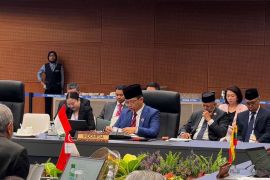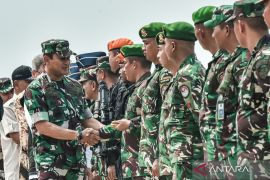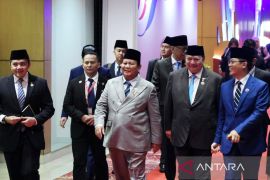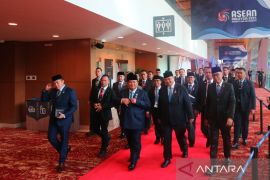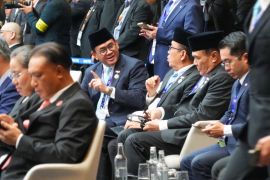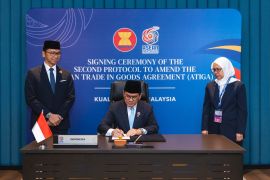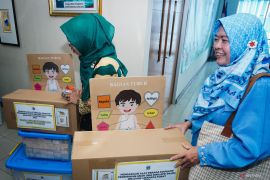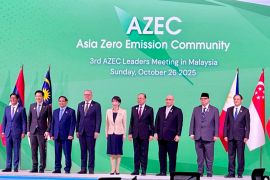The ASEAN leaders at the 19th ASEAN Summit and Related Summits in Bali on Thursday (Nov 17) adopted a Chairman`s Statement on Cooperation in Flood Prevention, Mitigation, Relief, Recovery, and Rehabilitation, initiated by Thailand which is the hardest hit by the floods in the region.
Of the 10 member countries of ASEAN, at least five, namely Thailand, Laos, Vietnam, Myanmar, and the Philippines, have been affected by floods. Some regions in Indonesia have also been flooded lately, but not as badly as the five other Southeast Asian countries.
In the statement, ASEAN leaders expressed deep sympathy and condolences to ASEAN member states that have been affected by massive floods that had caused the loss of many lives and great damage to property.
The leaders agreed to further enhance cooperation in disaster risk management and mitigation, in order to better cope with increasingly unpredictable weather conditions, which may be attributable to climate change.
According to latest reports, a total of 594 people were confirmed dead and two people were missing in the floods that have inundated the upper part of Thailand for about four months.
The Thai Disaster Prevention and Mitigation Department announced on Friday (Nov 18) that 27 more people were confirmed dead on Thursday in the central province of Ayutthaya (20), Nakhon Pathom (4) and Ubon Ratchathani (3), Xinhua reported.
Flood waters were still high in 19 of 77 provinces and affecting about 5.1 million people or 1.9 million households.
Large parts of the capital Bangkok are also flooded and there are fears the city center could yet be worst hit.
At an ASEAN Finance Ministers` Investor Seminar (AFMIS) in Jakarta, on November 8, 2011, every member country of ASEAN reported that they were affected by the flooding in Thailand. Their food imports from Thailand were disrupted and so were their exports to the flood-affected country.
As the current ASEAN Chair, President Susilo Bambang Yudhoyono had provided assistance for flood victims and restoration efforts in the flood-hit ASEAN member countries.
The head of state said that as chairman of ASEAN, Indonesia was under obligation to address every disaster within the region.
He had instructed Foreign Minister Marty Natalegawa to take steps to channel assistance in cooperation with the ASEAN Secretariat.
The Indonesian Government`s financial assistance was presented on October, 24, 2011, to six ASEAN member countries being affected by floods.
Cambodia, Lao PDR, Myanmar, the Philippines, Thailand, and Viet Nam received a total of US$3.1 million from Indonesia.
Indonesia`s Coordinating Minister for People`s Welfare Agung Laksono handed over the assistance in the form of cheques to the ambassadors or representatives of the six South East Asian countries.
Thailand, the worst-hit country, received US$1 million, while Viet Nam received US$500,000. The other four countries received US$400,000 each.
When receiving the cheques, the Permanent Representative of Cambodia to ASEAN, Kan Pharidh, extended his country`s deepest gratitude for Indonesia`s assistance in time of difficulty.
"This is not the first time that Indonesia has rushed to the aid of its fellow ASEAN countries, so the people of Cambodia are grateful to its friend in need. In Cambodia, public places like pagodas and schools have been flooded. Children will have no choice but to start school later this year," Cambodian Ambassador to Indonesia Kan said as quoted in the ASEAN Secretariat in a press statement.
Other ASEAN member countries had reportedly also helped Thailand by among other things sending heavy-duty equipment or helicopters.
To assess flood-affected areas, the ASEAN Secretariat had dispatched an ASEAN-Emergency Rapid Assessment Team (ERAT) to Thailand on October 15.
The ERAT team consisting of officers from Brunei Darussalam, Indonesia, Malaysia and Singapore, along with three in-country ERAT members, worked under the supervision of the Director of the Emergency Operation Center of Thailand and in coordination with the Department of Disaster Prevention and Mitigation.
ASEAN-ERAT was established by the ASEAN Committee on Disaster Management (ACDM) which comprises the heads of national disaster management organisations in the ten ASEAN member countries.
Since its establishment, ASEAN-ERAT has been deployed to several disaster areas in the region, including Cyclone Nargis in May 2008, floods in Lao PDR in 2009, and tsunami on Mentawai island in Indonesia in October 2010.
An AHA (Asean Humanitarian Assistance ) Center to be based in in Jakarta was officially launched on the sidelines of 19th ASEAN Summit in Bali on November 17, 2011.
When fully operational, the AHA Center will serve as the coordination hub and center point for mobilisation of resources to disaster affected areas in the ASEAN region.
Thailand`s floods had also affected Japan, which is a major investor in Thailand and a dialog partner of ASEAN (Association of Southeast Asian Nations) which groups Brunei Darussalam, Cambodia, Laos, Malaysia, Myanmar, Indonesia, Singapore, Thailand, the Philippines and Vietnam.
On the sidelines of the 19th ASEAN Summit, Noriyuki Shikata, the deputy cabinet secretary at the Japanese prime minister`s office, told the press in Nusa Dua, Bali, on Friday (Nov 18), that his government would assist Thailand in tackling the impacts of its prolonged floods which had also affected the supply chain of the automotive industry in Japan.
"Regarding the disaster occurring in Thailand, we are trying to help because there is an economic link between Japan and Thailand, where there is a disruption in the chain of automotive supply,".
Two giant Japanese automotive companies, Toyota and Mitsubishi, had been forced to close three plants in Thailand for a month due to the flooding.
The closure caused a shortage in automotive spare part supplies in Japan and several other Asian countries, as well as Northern America and South Africa.
"We will help because our investment in Thailand is affected, and the (Thai) government will facilitate (us)," Noriyuki said.
Thai Prime Minister Yingluck Shinawatra had proposed spending 130 billion baht ($4.2 billion) on reconstruction and steps to prevent future floods.
She wanted to reassure investors that Thailand remains a safe place for business, as companies including Pioneer Corp. (6773), Honda Motor Co. and Toyota Motor Corp. (7203) scrapped profit forecasts after the floods shut factories.
During the ongoing ASEAN Summit, Yingluck pushed for ASEAN support for greater cooperation in tackling flooding.
The ASEAN leaders agreed that disaster relief and assistance following natural disasters were crucial issues and they would be raised at the East Asia Summit as well as during the ASEAN-Russia and ASEAN-US dialogue discussions scheduled for Saturday (Nov 19).
"Thailand is crucial to ASEAN. It is the second-largest economy after Indonesia. Thailand is a center of business and investment. Whatever happens to Thailand affects the supply line, affects many countries and all countries, especially those involved in the electronics, automobile and food industries. It also affects growth in the region," Dr Surin said recently. (*)
Reporter: By Fardah
Editor: Kunto Wibisono
Copyright © ANTARA 2011

